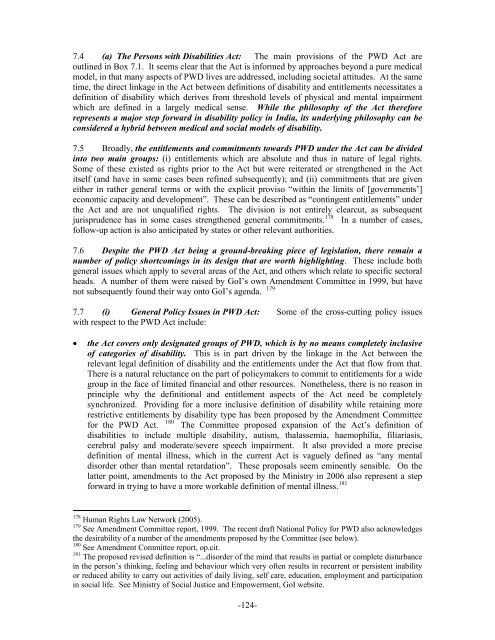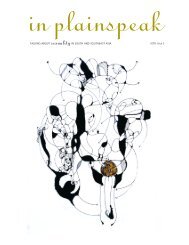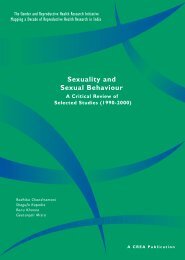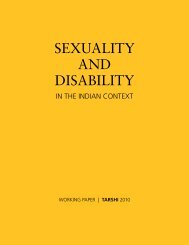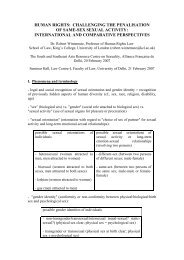People with Disabilities in India: From Commitment to Outcomes
People with Disabilities in India: From Commitment to Outcomes
People with Disabilities in India: From Commitment to Outcomes
You also want an ePaper? Increase the reach of your titles
YUMPU automatically turns print PDFs into web optimized ePapers that Google loves.
7.4 (a) The Persons <strong>with</strong> <strong>Disabilities</strong> Act: The ma<strong>in</strong> provisions of the PWD Act are<br />
outl<strong>in</strong>ed <strong>in</strong> Box 7.1. It seems clear that the Act is <strong>in</strong>formed by approaches beyond a pure medical<br />
model, <strong>in</strong> that many aspects of PWD lives are addressed, <strong>in</strong>clud<strong>in</strong>g societal attitudes. At the same<br />
time, the direct l<strong>in</strong>kage <strong>in</strong> the Act between def<strong>in</strong>itions of disability and entitlements necessitates a<br />
def<strong>in</strong>ition of disability which derives from threshold levels of physical and mental impairment<br />
which are def<strong>in</strong>ed <strong>in</strong> a largely medical sense. While the philosophy of the Act therefore<br />
represents a major step forward <strong>in</strong> disability policy <strong>in</strong> <strong>India</strong>, its underly<strong>in</strong>g philosophy can be<br />
considered a hybrid between medical and social models of disability.<br />
7.5 Broadly, the entitlements and commitments <strong>to</strong>wards PWD under the Act can be divided<br />
<strong>in</strong><strong>to</strong> two ma<strong>in</strong> groups: (i) entitlements which are absolute and thus <strong>in</strong> nature of legal rights.<br />
Some of these existed as rights prior <strong>to</strong> the Act but were reiterated or strengthened <strong>in</strong> the Act<br />
itself (and have <strong>in</strong> some cases been ref<strong>in</strong>ed subsequently); and (ii) commitments that are given<br />
either <strong>in</strong> rather general terms or <strong>with</strong> the explicit proviso “<strong>with</strong><strong>in</strong> the limits of [governments’]<br />
economic capacity and development”. These can be described as “cont<strong>in</strong>gent entitlements” under<br />
the Act and are not unqualified rights. The division is not entirely clearcut, as subsequent<br />
jurisprudence has <strong>in</strong> some cases strengthened general commitments. 178 In a number of cases,<br />
follow-up action is also anticipated by states or other relevant authorities.<br />
7.6 Despite the PWD Act be<strong>in</strong>g a ground-break<strong>in</strong>g piece of legislation, there rema<strong>in</strong> a<br />
number of policy shortcom<strong>in</strong>gs <strong>in</strong> its design that are worth highlight<strong>in</strong>g. These <strong>in</strong>clude both<br />
general issues which apply <strong>to</strong> several areas of the Act, and others which relate <strong>to</strong> specific sec<strong>to</strong>ral<br />
heads. A number of them were raised by GoI’s own Amendment Committee <strong>in</strong> 1999, but have<br />
not subsequently found their way on<strong>to</strong> GoI’s agenda. 179<br />
7.7 (i) General Policy Issues <strong>in</strong> PWD Act: Some of the cross-cutt<strong>in</strong>g policy issues<br />
<strong>with</strong> respect <strong>to</strong> the PWD Act <strong>in</strong>clude:<br />
• the Act covers only designated groups of PWD, which is by no means completely <strong>in</strong>clusive<br />
of categories of disability. This is <strong>in</strong> part driven by the l<strong>in</strong>kage <strong>in</strong> the Act between the<br />
relevant legal def<strong>in</strong>ition of disability and the entitlements under the Act that flow from that.<br />
There is a natural reluctance on the part of policymakers <strong>to</strong> commit <strong>to</strong> entitlements for a wide<br />
group <strong>in</strong> the face of limited f<strong>in</strong>ancial and other resources. Nonetheless, there is no reason <strong>in</strong><br />
pr<strong>in</strong>ciple why the def<strong>in</strong>itional and entitlement aspects of the Act need be completely<br />
synchronized. Provid<strong>in</strong>g for a more <strong>in</strong>clusive def<strong>in</strong>ition of disability while reta<strong>in</strong><strong>in</strong>g more<br />
restrictive entitlements by disability type has been proposed by the Amendment Committee<br />
for the PWD Act. 180 The Committee proposed expansion of the Act’s def<strong>in</strong>ition of<br />
disabilities <strong>to</strong> <strong>in</strong>clude multiple disability, autism, thalassemia, haemophilia, filiariasis,<br />
cerebral palsy and moderate/severe speech impairment. It also provided a more precise<br />
def<strong>in</strong>ition of mental illness, which <strong>in</strong> the current Act is vaguely def<strong>in</strong>ed as “any mental<br />
disorder other than mental retardation”. These proposals seem em<strong>in</strong>ently sensible. On the<br />
latter po<strong>in</strong>t, amendments <strong>to</strong> the Act proposed by the M<strong>in</strong>istry <strong>in</strong> 2006 also represent a step<br />
forward <strong>in</strong> try<strong>in</strong>g <strong>to</strong> have a more workable def<strong>in</strong>ition of mental illness. 181<br />
178 Human Rights Law Network (2005).<br />
179 See Amendment Committee report, 1999. The recent draft National Policy for PWD also acknowledges<br />
the desirability of a number of the amendments proposed by the Committee (see below).<br />
180 See Amendment Committee report, op.cit.<br />
181 The proposed revised def<strong>in</strong>ition is “...disorder of the m<strong>in</strong>d that results <strong>in</strong> partial or complete disturbance<br />
<strong>in</strong> the person’s th<strong>in</strong>k<strong>in</strong>g, feel<strong>in</strong>g and behaviour which very often results <strong>in</strong> recurrent or persistent <strong>in</strong>ability<br />
or reduced ability <strong>to</strong> carry out activities of daily liv<strong>in</strong>g, self care, education, employment and participation<br />
<strong>in</strong> social life. See M<strong>in</strong>istry of Social Justice and Empowerment, GoI website.<br />
-124-


